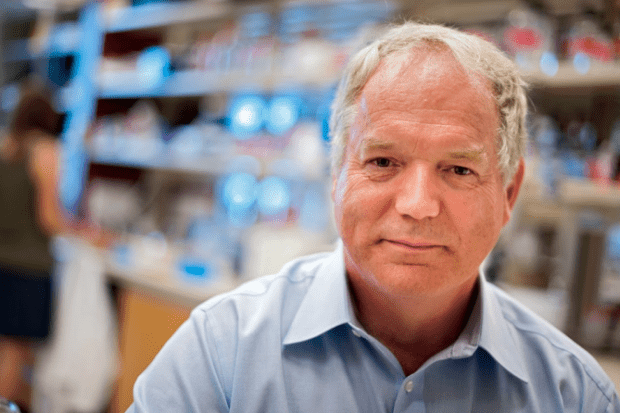With coronavirus cases soaring and several countries bringing in tougher lockdown measures, many people are struggling to find much cause for optimism at the moment. But Britain’s latest Nobel laureate in medicine is not one of them.
“We just have to hang on – a vaccine is just around the corner,” insisted Michael Houghton, who shared this year’s prize in physiology or medicine with US scientists Charles Rice and Harvey Alter for their “seminal discoveries” that led to the discovery of the virus hepatitis C.
Speaking to Times Higher Education from his home in California, Professor Houghton said he understood the growing frustration with coronavirus restrictions, “especially for those with small businesses”, but called on people to “be a bit more patient and wait for the vaccine”.
“There is a good chance that at least one of the vaccine candidates will be effective,” said Professor Houghton, who is Canada excellence research chair in virology and Li Ka Shing professor of virology at the University of Alberta.
“We’ve come this way for eight to nine months, so if we can stick in for another few months…Then we can get people who are at risk vaccinated and we can start to open up,” said Professor Houghton.
The 69-year-old’s belief in an imminent vaccine is not based simply on faith in his scientific peers; Professor Houghton has been involved in the world of vaccines for almost a decade, first with work related to a potential vaccine for hepatitis C, one of which has entered human trials, and more recently with a Covid vaccine being developed by colleagues at Alberta.
Does his positive outlook square, however, with recent reports that a Covid vaccine will only become available by the middle of 2021 at the earliest?
“We have so many candidates in phase 3 – they are all different and there is a very good chance – not a 100 per cent chance – that…one of these candidates will show efficacy and safety in November,” predicted Professor Houghton, who added that “in the new year, they will start rolling out tens of millions of vaccines in the UK, US and Canada”.
“I am optimistic – perhaps by nature – but probably by February or March you will see the high-risk groups – our fantastic health workers and first responders – being vaccinated and then it will be the people with co-factors and the elderly,” he said.
While some scientists fear the public’s trust in science is starting to crumble – with lockdowns failing to produce the suppression of Covid that many imagined – Professor Houghton argued that scientists should not be gloomy. “I understand that people are frustrated but this is a global pandemic, and if countries had not taken unprecedented measures, we may have seen 10 million people die of Covid, rather than 1 million,” he said.
Professor Houghton added that the vaccine candidates in development were “a great example of academia working with government and big pharma”.
“One of the good things about the US is how they encourage public health agencies to give grants to universities and drug companies, and they all work together,” he said, noting that, while working on hepatitis at the San Francisco-based Chiron Corporation, one of his key collaborators was Dan Bradley, from the Centers for Disease Control and Prevention.
Professor Houghton’s network of colleagues in Canada and the US – in academia, government and big pharma – reflects a career that is noticeably different from those of recent British medicine Nobelists, who have largely been based in the UK and often Oxbridge.
In contrast, Professor Houghton’s PhD at King’s College London was sponsored by a pharmaceutical firm and he left the UK 40 years ago to work at a biotech start-up in California, where he undertook his Nobel-winning hepatitis research.
His scientific career has had a few other unusual turns, too, he admitted. While Professor Houghton, the son of a London truck driver, excelled at school and took his A levels in maths and physics a year early, he was unable to study biosciences at a “more established university” because he did not have a biology A level. Instead, he went to the University of East Anglia, which had been opened just six years earlier in 1963.
“It was actually one of my top picks and I did some great things there but I probably had too good a time,” he reflected. “I ended up with a 2:2 – instead of the 2:1 I was predicted – which meant the PhD fellowships that I’d been offered disappeared,” he said.
His move to the US in the late 1970s was because “the state of UK science and, in particular, industrial science was very poor”, he said.
“Britain was really in the doldrums – it was bankrupt and borrowing money – so when an opportunity arose to work at a company founded by two University of California professors, I took it,” he said. “I’ve never considered coming back to Britain.”
However, Professor Houghton said that he might have stayed longer in the UK if he were young nowadays, given the thriving state of the country’s biomedical industries. “In science, Britain is doing much better and is back on a very high level, as we’ve seen in the way Oxford has responded to Covid,” he said.
POSTSCRIPT:
Print headline: Nobel winner ‘optimistic’ about Covid vaccine
Register to continue
Why register?
- Registration is free and only takes a moment
- Once registered, you can read 3 articles a month
- Sign up for our newsletter
Subscribe
Or subscribe for unlimited access to:
- Unlimited access to news, views, insights & reviews
- Digital editions
- Digital access to THE’s university and college rankings analysis
Already registered or a current subscriber? Login










